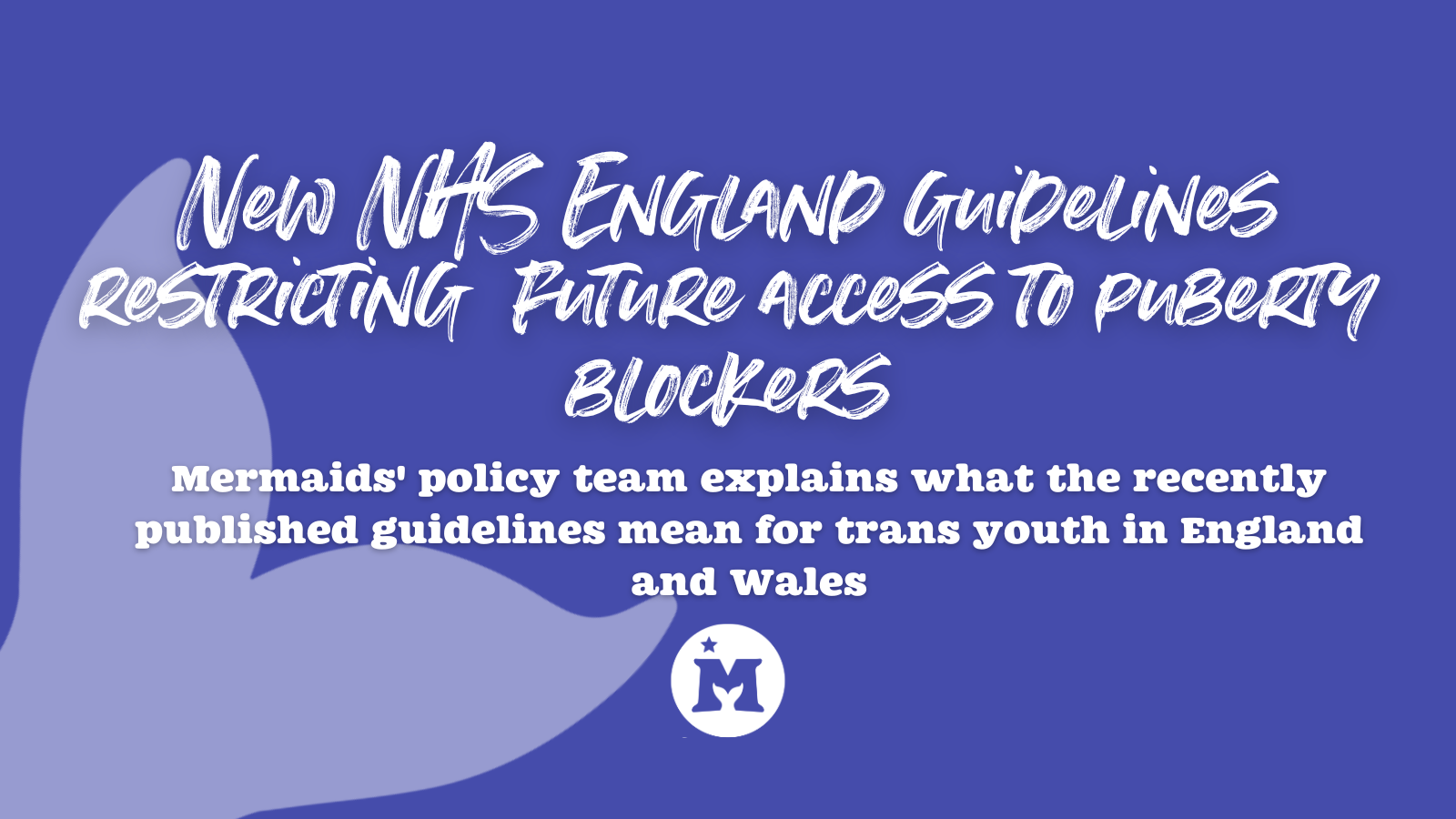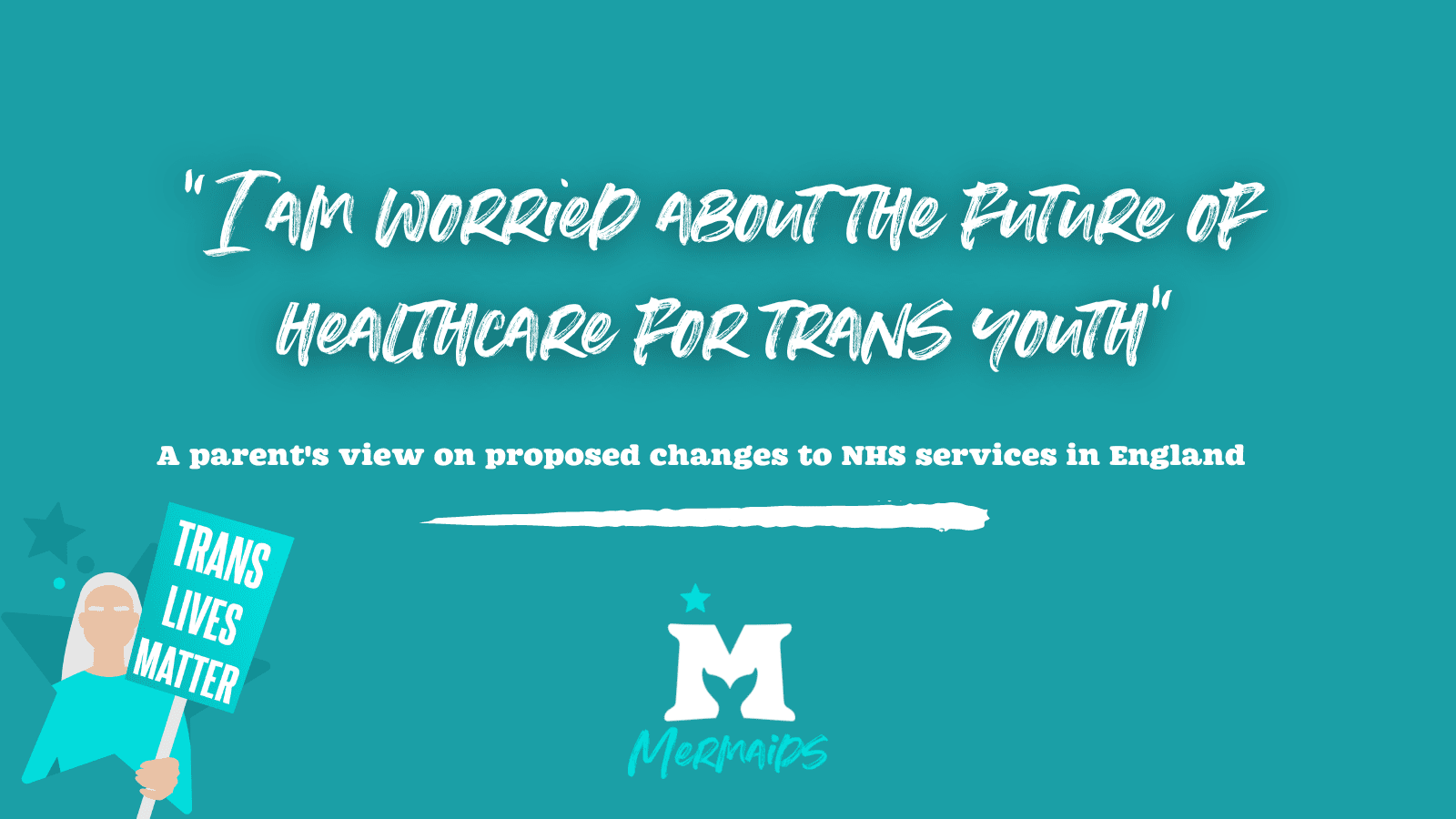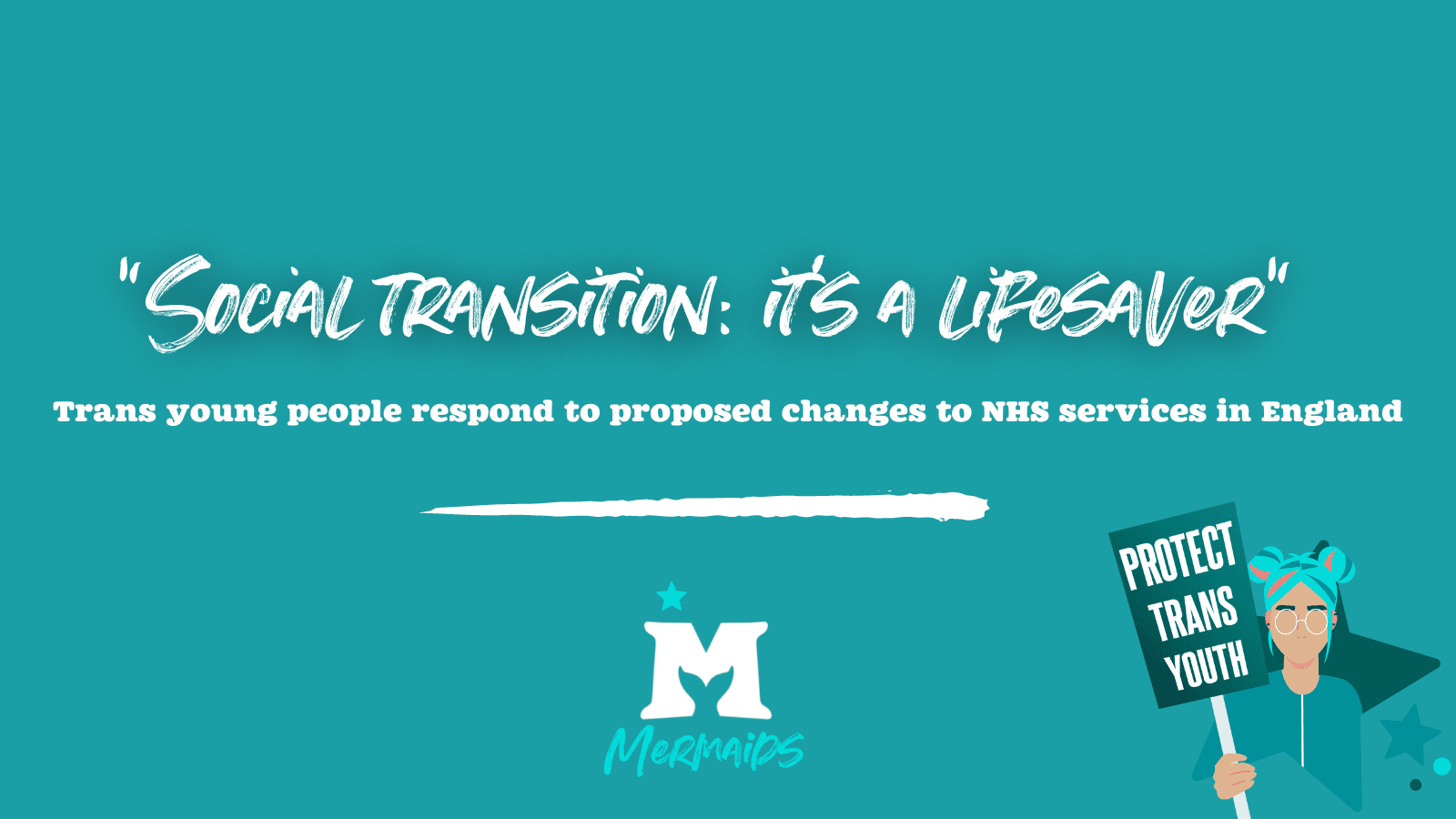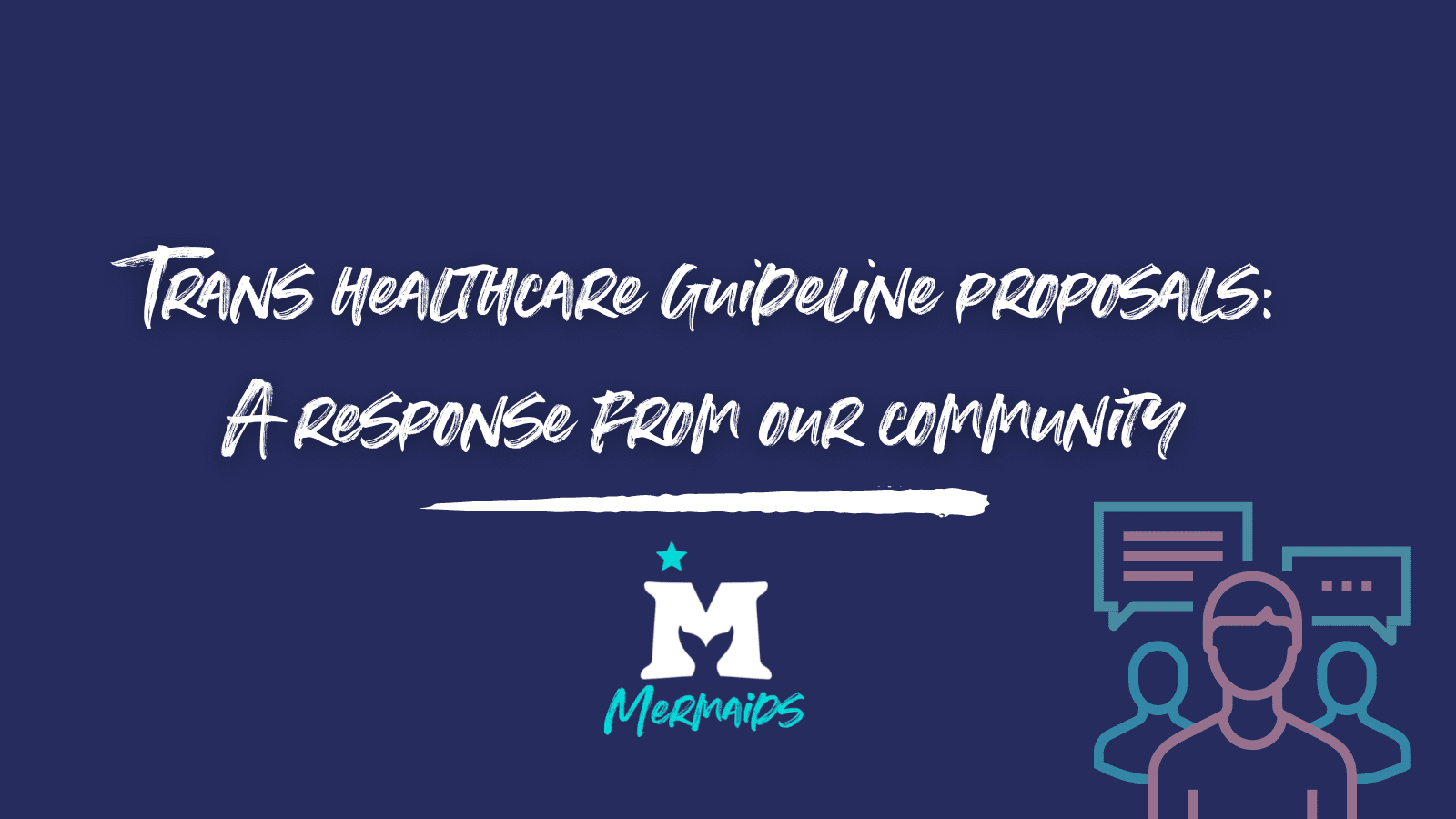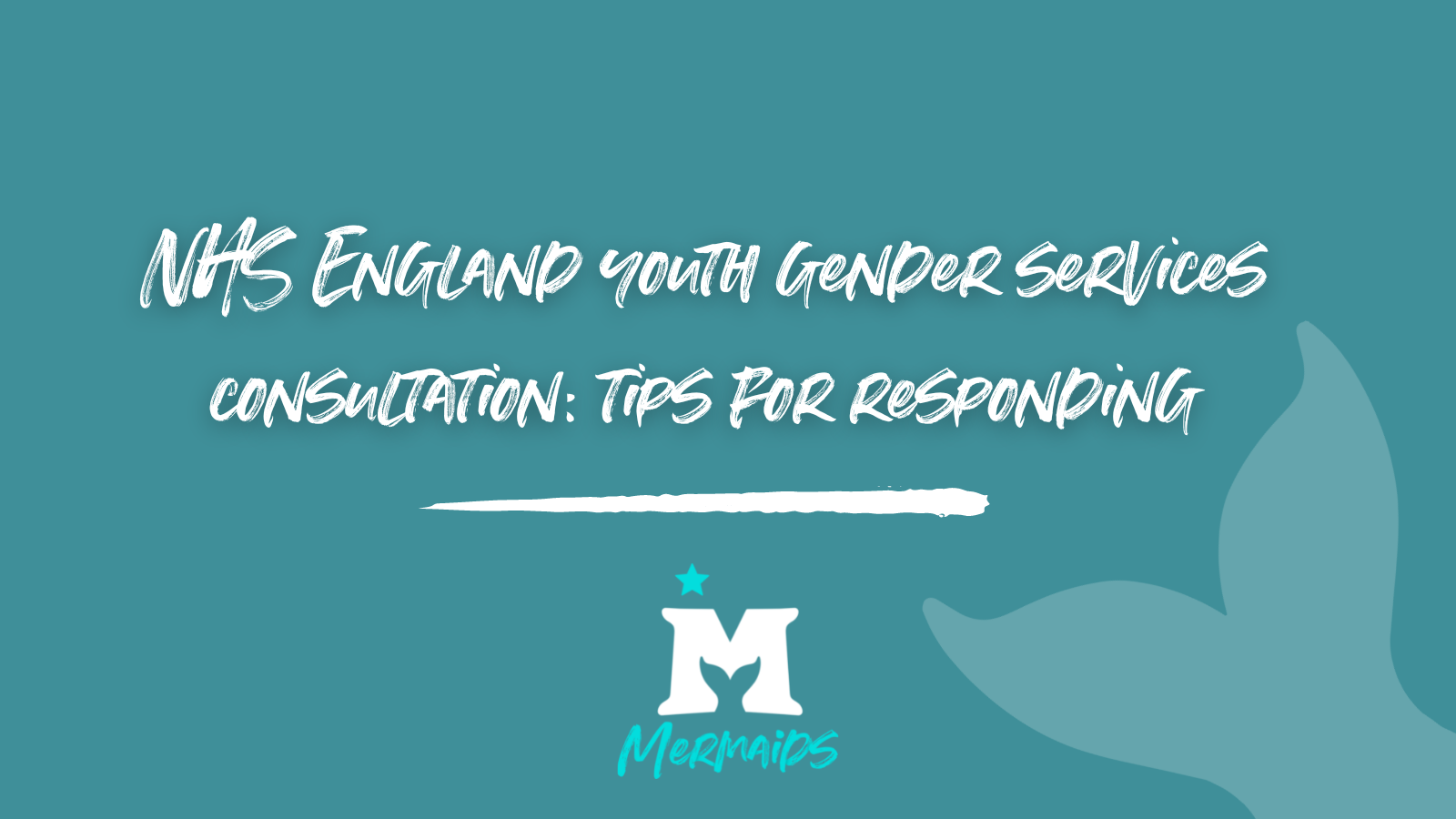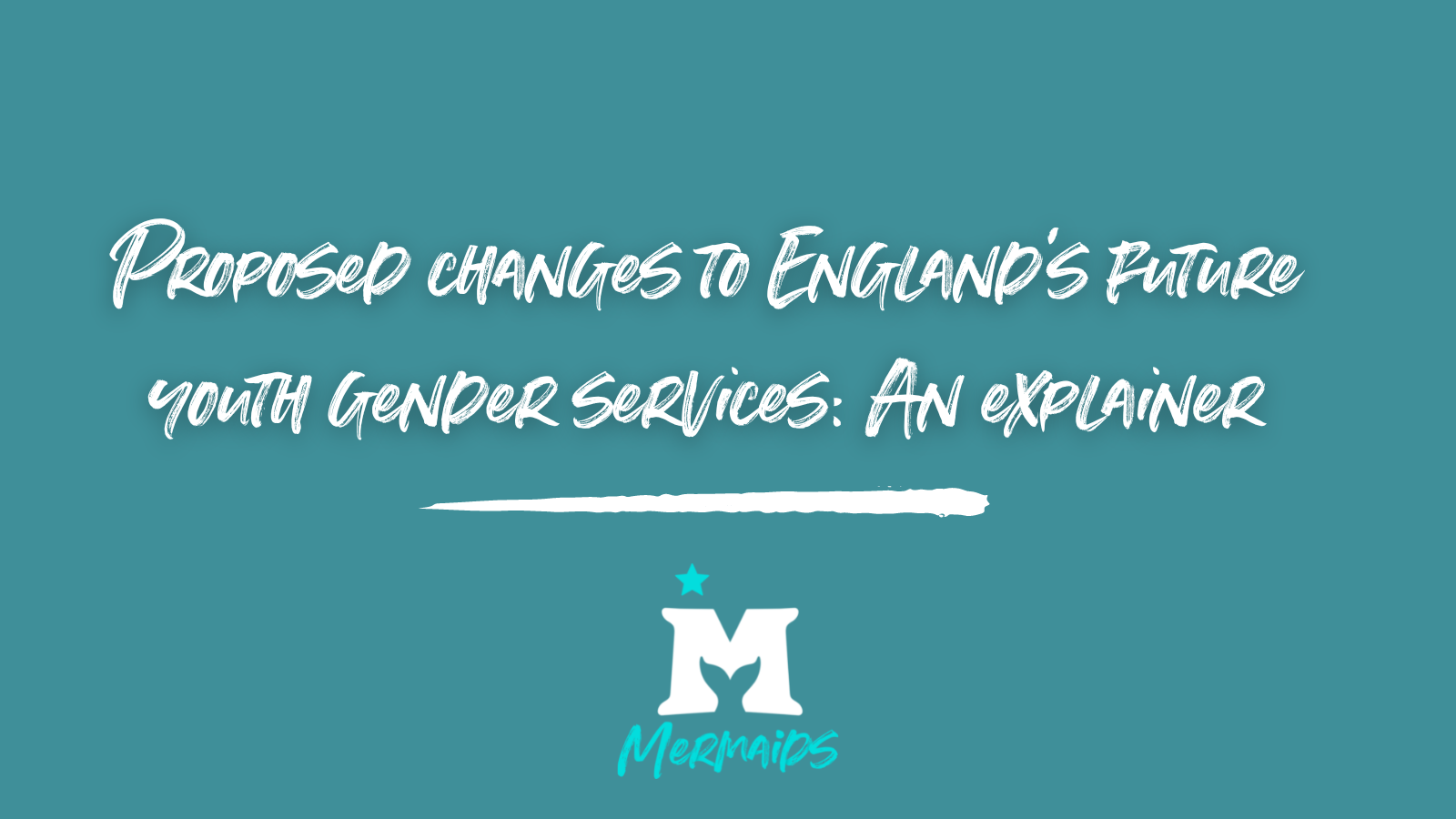Mermaids’ policy team explains what the recently published guidelines mean for trans youth in England and Wales
NHS England has published guidelines for how the new Hubs replacing GIDS will deliver children and young people’s gender related healthcare, which will be updated based on the Cass Review’s final report.
While responses from Mermaids and supporters mitigated some of the most harmful proposals from the consultation, the final version continues to restrict, pathologise and undermine access to care.
These guidelines do not come into effect until the new Hubs open, and do not apply to current GIDS patients at this point.
- Waiting times: nobody will be taken off the ever-growing waiting list, now at almost 7,500 people, until the new Hubs are established. We believe this has been the case for many months, which is wholly unacceptable.
- Access to puberty blockers: is to be restricted to only those with “early-onset gender dysphoria” as part of mandatory research.
- Social Transition: despite improvements since the initial draft, the approach to social transition remains overly medicalised and unclear.
- Private Providers: the guidelines still take a punitive approach to families using private providers to access gender-affirming care, unless under very specific circumstances.
- Neurodivergent young people fear they will face additional barriers when seeking support.
An Analysis of the Specification
It is wholly unacceptable that the already excessive 3+ year wait for a first appointment has grown even longer in the period of chaos between announcing the closure of GIDS (July 2022) and the opening of new services later this year.
As of April 2023, there are 7,484 children and young people on the waiting list for a first appointment. GIDS has “ceased commencing new appointments” for the waiting list, which is “likely to remain in place until the new providers begin seeing new patients, planned later in 2023” (Equality and Health Impact Assessment p.19). We understand that few, if any, new appointments have been offered over the past six months.
Access to Puberty Blockers
NHS England has stated that puberty blockers will no longer be “routinely available” and only be prescribed as part of a research protocol.
The nature of this research will be decided by a newly established Oversight Board, which has, so far, only approved the development of a study into the use of puberty blockers for those described as experiencing “early-onset gender dysphoria”.
At no point has this term been defined, and a review of existing literature shows it is predominantly used by discredited researchers who have supported the roll back of transgender rights and anti-trans discrimination protections.
We are particularly concerned that “early-onset” is used alongside “rapid-onset gender dysphoria” in other academic literature, an offensive and debunked theory that argues the rise in young people coming out as trans is a “social contagion” rather than a result of growing societal acceptance.
International professional bodies specialising in gender-related healthcare disagree with the guidelines’ mandatory research enrolment, emphasising the evidence supporting the safe use of reversible puberty blockers. NHS England appears to be basing its approach on outdated and pathologising theories from gender-critical groups who reject the existence of trans childhood.
Not only is it deeply unethical to force young people into a research trial simply to access treatment but the restrictive criteria will compound inequalities by forcing families to use expensive private providers, and result in avoidable distress for trans youth.
The guidelines continue to highlight the supposed “risks” of social transition, however our campaigning has meant that NHS England will no longer require a formal diagnosis of gender dysphoria for clinicians to support socially transitioning. In fact, they state that “Social transition is something that should be led by the young person with family input”.
The approach to social transition for adolescents has been described as “informed consent” yet we feel the language in the specification continues to overly medicalise being trans, in stating that social transition should only happen where it is “necessary” for a young person’s social functioning. We think the choice should always lie solely with a young person.
For children, the guidelines remain out of step with the experiences of the children we work with, who find social transition to be deeply affirming. Changing your name or pronouns should not be a decision that requires approval or observation from medical professionals. Instead, it is the responsibility of our public services to end the “risk”, such as the stigma and discrimination that trans, non-binary and gender-diverse young people often face.
Many families were worried by the initial specification which threatened to report parents to local safeguarding authorities if their young person was accessing healthcare through a private provider. It is positive that the NHS has listened to these concerns, and removed this. But the guidelines take an overly punitive approach to those accessing private care.
Our major concern is that if a young person is rejected under the restrictive eligibility criteria for blockers and/or gender-affirming hormones, clinicians are encouraged to suggest that a young person’s GP “considers what safeguarding protocols may be appropriate”.
Families access private care because they are desperate and have been failed by the long waiting times. They should be supported by the NHS rather than being reported to local safeguarding measures.
Many young people we work with highlighted the ableism present in the idea that their neurodivergence diminished, or “explained away” their trans identity.
While we welcome greater support for young people around their mental health and other aspects of neurodiversity, this should not create additional barriers for them to access gender-related care.
In particular, the requirement that clinicians explore the relationship between neurodivergence and gender identity remains a concern that could lead to yet more distressing and invalidating conversations, where neurodivergent patients feel their neurodivergence is framed as a “cause” of their gender identity, rather than existing alongside.
What’s next?
This specification will come into force when the new Hubs open, in autumn 2023 for the Southern Hub and April 2023 for the Northern Hub. NHS England will also be releasing further guidelines for public consultation on puberty blockers, the referral process, and gender-affirming hormones.
Mermaids is working hard to get more clarity and answers from NHS England and advice for experts in the field, and will share further information when we can.
You can support our work to advocate with and for trans young people and their families by signing up to our mailing list and joining a growing movement of people coming together to create a better world for trans young people.
If you find any of this distressing and would like some support, do call our helpline on 0808 801 0400. Our team are available Monday to Friday, 9am – 9pm.
Your Questions Answered: The new “interim service specification“
What does this specification do, and when does it start?
A service specification defines the standards of care for a service, in this case, the new Hubs replacing GIDS. This specification will only apply to the new services, which open in autumn 2023 (Southern Hub) and April 2024 (Northern Hub). It will apply until a final specification is made, following the Cass Review’s final report (date unknown).
Is NHS England stopping the prescription of puberty blockers?
Not entirely, but they will no longer routinely prescribe puberty blockers. Only those who are part of mandatory research will be eligible, which currently only includes those deemed to have “early-onset gender dysphoria”.
Who is eligible for the research protocol to be prescribed puberty blockers?
To our understanding, the only research proposed would be restricted to those deemed to have “early-onset gender dysphoria”.
What do they mean by “early onset gender dysphoria”?
We also do not know! The diagnostic criteria is unclear, and the term is largely used by anti-gender groups. Whereas the rest of the guidance uses the ICD-11 framework of gender incongruence or the DSM-5 criteria of gender dysphoria, this term is based on neither internationally-set standard.
What about current GIDS patients who access puberty blockers?
NHS England has previously said that the research protocol will not be applied retrospectively, so won’t affect those already prescribed puberty blockers. We have sought reconfirmation of this.
Will I be referred to local safeguarding measures if I need to access private care?
The guidelines no longer recommend that GPs refer families accessing private gender care (“unregulated medication”) to local safeguarding measures. However, they do still “suggest that the GP or local health professional considers what safeguarding protocols may be appropriate” (p.18) if a patient enters the NHS England pathway already on blockers or gender-affirming hormones, and is not accepted by the service to continue their care. There are various reasons why the service won’t accept continuation of care, listed on page 17, including if they’ve accessed gender-affirming hormones before approximately 16 years of age.
Do I need a diagnosis to socially transition?
No. The guidelines specifically stated that “social transition is something that should be led by the young person with family input”. However, the guidelines do say children and young people and their families will undergo “an in-depth process of discussion and thinking around the decision of social transition” if they “will present in public fully… in all forms and aspects of their daily lives” (p. 12-13).
I am accessing blockers or hormones from a private provider right now. What does this mean for me?
There is a possible pathway onto the NHS England services for those accessing private care (“unregulated sources and providers”), which is a welcome change. However, the patient must meet certain criteria (p. 17).
For blockers, they must stop using the medication for a brief period of time to assess a baseline, and be assessed by the service to meet the research requirement.
For gender-affirming hormones, they must have documented evidence of assessment, evidence of multi-disciplinary team support, not start before puberty, have used puberty blockers for 12 months prior, not start before 16 years of age, and have evidence that fertility was discussed.
What does this mean for neurodiverse people?
The new service will include people with expertise in the direct assessment of autism, ADHD and other forms of neurodiversity. While this could provide more holistic care and support, neurodivergent trans young people we work with worry that the assessment would focus on “fixing their neurodiversity” before supporting their gender incongruence/dysphoria.
Your Questions Answered: GIDS’ closure and new Hubs
In May, NHS England gave updates on the timeline for the Hubs replacing GIDS, which we have explained in another blog.
Has GIDS at Tavistock already closed?
NHS England announced in May 2023 that GIDS would remain open until at least April 2024, focusing on their open caseload (around 1,000 patients). They are not offering new appointments, although this could change.
When do the new Hubs start?
The Southern Hub (London-based) is due to open in autumn 2023, and the Northern Hub (Manchester/Liverpool) in April 2024. This was delayed from spring 2023.
Can people still be referred to a service right now?
What about people still on the current waiting list?
The waiting list is now held with NHS Arden and GEM. Anyone referred to GIDS should have been transferred to them, and will be receiving a letter from NHS England shortly.
Is anyone being taken off the waiting list right now?
No. NHS England confirmed that “GIDS has ceased commencing new assessments” and this is “likely to remain in place until the new providers begin seeing new patients, planned later 2023”.
What about current patients?
GIDS will continue to support their current caseload. When the new services open, we understand that patients will be transferred to the appropriate service.


